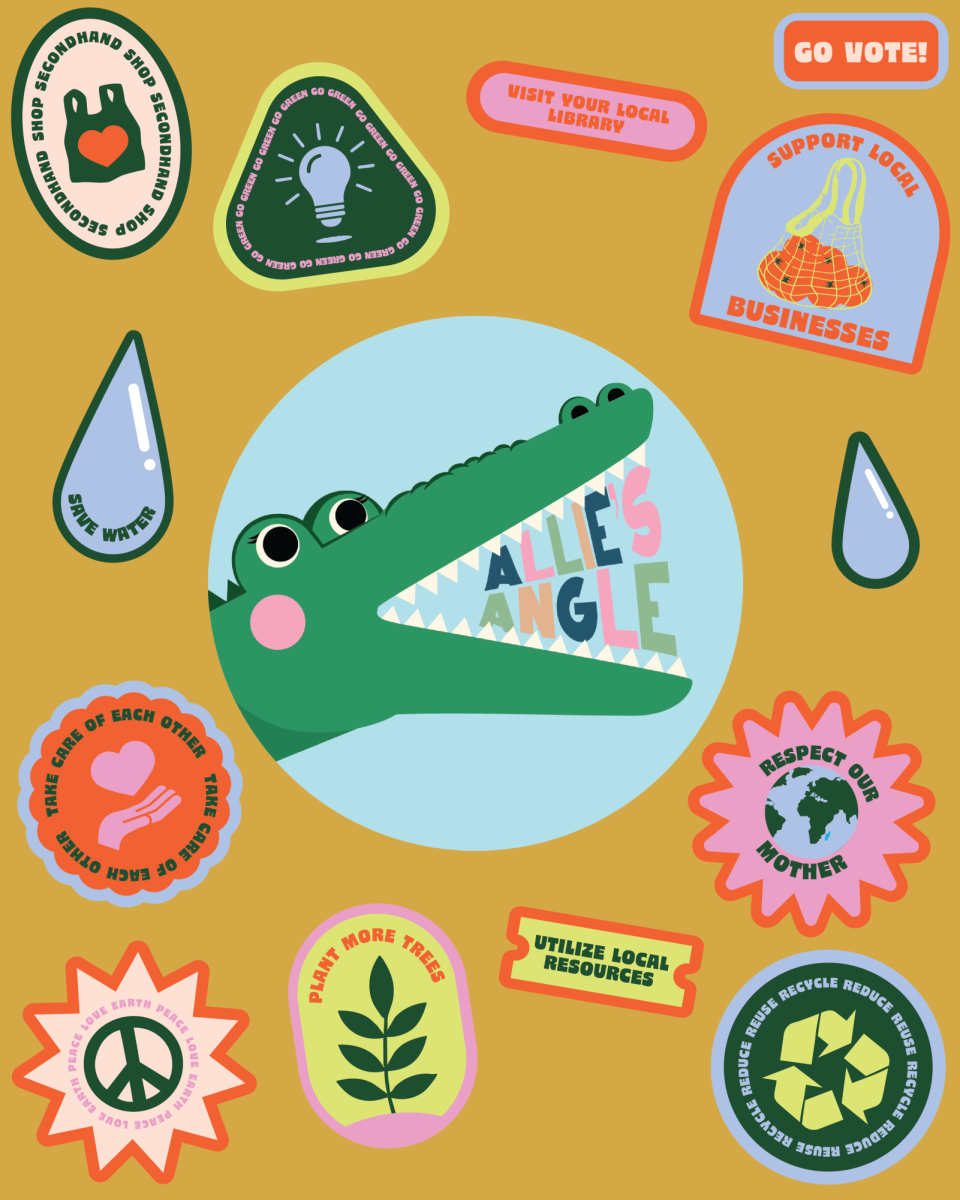During an overwhelming adjustment period, responding to the pressure of climate change and rising political tensions can feel nearly impossible for students. However, on a planet that has already hurtled past the Paris Agreement’s 1.5 degrees Celsius benchmark, it is more important than ever for younger generations to understand their influence on the planet and work proactively to mitigate it.
Below are a handful of accessible, earth-friendly endeavors students can explore to make this upcoming semester the start of their contribution to a more sustainable future.
Thrifting
This is an obvious one, but it’s infinitely important nonetheless. The bounds of thrifting are practically nonexistent, and the finds are always superior to any of the overpriced plastic crowding the inventories of big corporations like Walmart or Amazon.
For students on a budget, the shelves of local stores like Ram’s Rack Thrift Shop, Regear Outdoors, Hebron Colony Thrift Store and Goodwill are overflowing with secondhand school essentials that allow consumers to tread lightly on the Earth. Facebook Marketplace and local garage sales are also reliable sources for finding apartment furnishings, work attire and hobby equipment.
Any chance to buy secondhand is a chance to subvert the constant pressure to spend buckets of money on fast fashion and poorly manufactured trends. Thrifting keeps valuable resources out of the landfill and wealth out of the pockets of those actively seeking to destroy the planet. Plus, it makes outfits and dorm decorations way more interesting.
Utilizing local resources
When it comes to necessities that can’t be found at thrift stores, it’s more challenging to abstain from supporting large anti-environmentalist companies. Luckily, App State and the surrounding High Country area has no shortage of resources that make sustainable consumption more accessible.
Buying food from local nonprofit organizations like FARM Cafe and Blue Ridge Women in Agriculture’s Food Hub is a more ethical alternative to shopping from large corporations. The food sold from these places is not only more likely to be healthier, but it also supports local farmers and decreases demand for carbon-intensive, foreign labor-dependent ingredients like those typically found in supermarkets.
In addition to local nonprofits, App State’s Office of Sustainability is an increasingly beneficial resource for students in need of anything from pantry refills to clothing. The office, located in East Hall’s basement, has a Free Store where students are encouraged to drop off and ‘shop’ for unexpired food and clothing in good condition.
Continuing the life cycles of items that already exist and supporting local organizations are a big part of what makes the difference between a climate-conscious lifestyle and one that values convenience over sustainability. Exploring these resources will not only reduce one’s personal influence on the environment but will also provide opportunities to form new experiences and connect with the App State and Boone communities — an immeasurably vital aspect of student life.
Volunteering
Speaking of community development, nothing screams “environmentalist” quite like a volunteer. The stress a full academic schedule places on one’s time and energy should not be ignored. However, for students who care about the earth and have time to give, helping out a local nonprofit is one of the best single things they can do.
Whether it be through a post-Hurricane Helene river cleanup with MountainTrue or picking up a shift at FARM Cafe, giving back is a choice that fuels a continuous trend of hope. It is a strong indicator that society is not contingent on the capitalistic greed of governments and billionaires but rather the kindness and collaboration of real people. This understanding is a structural pillar to the creation of a sustainable future and young generations are an essential part of that achievement.
Political participation
Lifestyle swaps are typically a more palatable argument to promote when encouraging young people to adopt sustainable practices, but in an increasingly volatile political climate where United States residents are pitted against their neighbors at every available opportunity, political participation must take precedence.
The current U.S. presidential administration has made it abundantly clear that its overarching mission is to solidify an indomitable empire of wealth and power by squashing democracy and ravaging the planet’s dwindling natural resources.
President Donald Trump has wasted no time unabashedly stripping endangered species of federal protections, exposing previously protected public lands to invasive resource extraction efforts and attempting to reignite the coal industry among many other threats. His One, Big, Beautiful Bill alone cleared the way for mass subsidizations of the oil and gas industries and sweeping shutdowns of clean energy initiatives with its passing in early July.
This despicable abuse of power in the name of greed is inexcusable and a direct threat to the very existence of the planet itself.
The most definitive way a student can pursue a sustainable existence is by speaking out about and fighting against the rampant injustices present everywhere around them. There is no possibility of a sustainable future when a handful of selfish men are allowed to believe the living, breathing, inalienable wonder of the earth and those who inhabit it belong to them.
Often, what sustainability comes down to is effort. It doesn’t take money to learn about the role individuals play in the environmental, political, economic and social well-being of the planet. It also costs very little to act on that understanding. From calling representatives and signing petitions to peacefully protesting and beyond, every eye that is turned toward the issues facing the planet and its population of living creatures is a new chance at creating something better.
Every new chance at creating something better is proof that the world is worth saving.




Leah Boone • Aug 14, 2025 at 12:20 pm
Love this!!! What an amazing article from a super cool and fun and smart Opinion Editor!